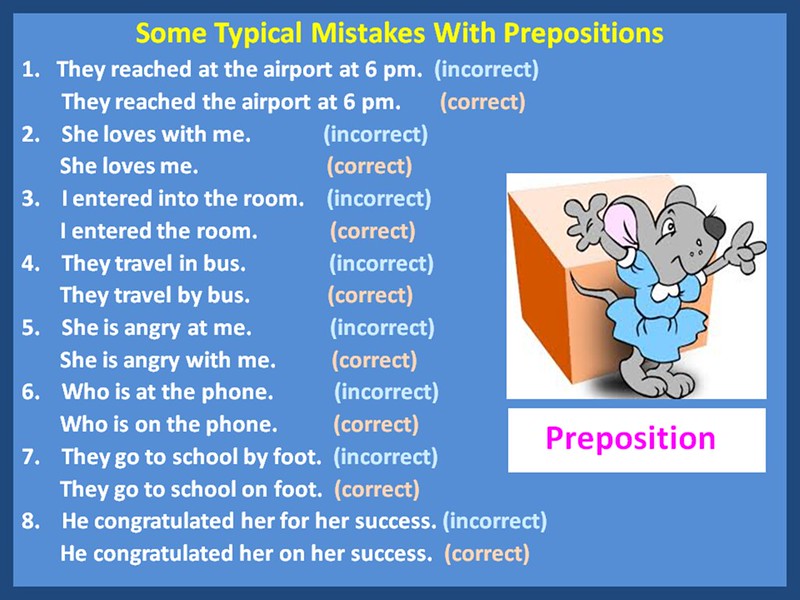Preposition Mistakes
How to avoid common preposition mistakes
This is a key part of building accurate grammar and natural-sounding English. Here’s a practical guide for how to recognize, teach, and correct prepositional errors.
GET MY FREE ENGLISH LANGUAGE SONGS AND WORKSHEETS HERE
📌 Why Preposition Mistakes Happen
Prepositions are small words (in, on, at, to, for, of) but carry big meaning. They’re often tricky for learners because:
-
They don’t always translate directly from other languages
-
One preposition can have many meanings
-
Prepositions often follow fixed patterns (e.g., interested in, good at)
Understanding how and why students make these errors helps teachers plan better instruction.
🧑🏫 How to Teach Students to Avoid Preposition Mistakes
1. Focus on High-Frequency Errors
Start by identifying the most common mistakes. Some examples:
-
❌ I’m good in English → ✅ I’m good at English
-
❌ She depends of her friends → ✅ She depends on her friends
-
❌ He is married with a doctor → ✅ He is married to a doctor
-
❌ I arrived to school late → ✅ I arrived at school late
✅ Tip: Create a “Top 10 Preposition Mistakes” board in class.
2. Teach Prepositions in Chunks
Instead of teaching prepositions alone, teach them as part of phrases:
-
interested in, afraid of, good at, listen to, talk to, arrive at This helps students remember them more naturally.
✅ Use visuals and context to support understanding.
3. Compare and Contrast
Use side-by-side examples to show correct and incorrect usage:
-
He lives in Canada vs. He lives on Canada ❌
-
We met at 5 PM vs. We met on 5 PM ❌
✅ Activity: “Correct the mistake” sentences
4. Use Contextual Practice
Give students real-life situations to use prepositions:
-
Talking about time and place: in the morning, at the park, on Monday
-
Describing relationships: married to, angry with, interested in
✅ Role-plays and sentence-completion games work well here.
5. Highlight Fixed Phrases and Collocations
Some verbs, adjectives, and nouns require specific prepositions:
-
responsible for, afraid of, rely on Teach these as chunks, and encourage memorization through repetition and use.
✅ Create preposition “families” with mind maps.
6. Error Correction with Sensitivity
When students make mistakes:
-
First, check if the meaning is still clear
-
Gently reformulate the sentence
-
Ask guided questions: “Do we say ‘interested on’ or ‘interested in’?”
✅ Use peer editing and group work to review errors together.
(image from trongduc25789)
🛠️ Extra Teaching Tips
-
Use games like Preposition Bingo, Correct or Incorrect, or Preposition Jeopardy
-
Keep a preposition wall or chart for common expressions
-
Encourage students to keep a personal “Preposition Notebook”
GET FREE ENGLISH LANGUAGE SONGS AND WORKSHEETS HERE
📅 LESSON PLAN: Preposition Mistakes
Level: Intermediate ESL
Time: 45–60 minutes
Focus: Grammar (Prepositions), Error Correction, Collocations
Objectives
-
Recognize and correct common preposition mistakes
-
Use common preposition + verb/adjective/noun collocations accurately
-
Practice in context through sentence correction and communication tasks
Materials
-
Preposition mistake worksheet (included)
-
Preposition error list (included)
-
Whiteboard or digital projector
Warm-Up (5 mins)
Ask students: “Which prepositions are the hardest for you?” Write answers on the board.
Presentation (10 mins)
-
Show 3–5 incorrect example sentences on the board (from the error list)
-
Ask students to identify and correct them
-
Explain common confusion patterns (e.g., L1 transfer, false friends)
Guided Practice (15 mins)
-
Work through Part A and B of the worksheet as a class
-
Emphasize memorizing common collocations (e.g., interested in, married to)
Pair Work (10 mins)
-
Students complete Part C in pairs (short dialogue correction)
-
Then act out or read their corrected version
Wrap-Up (5 mins)
-
Review tricky examples from the worksheet
-
Assign one preposition phrase for each student to teach the class tomorrow
GET FREE ENGLISH LANGUAGE SONGS AND WORKSHEETS HERE
WORKSHEET: Fixing Preposition Mistakes
Part A: Correct the Mistakes
Correct the incorrect prepositions in these sentences.
-
I’m good in cooking.
-
We arrived to the airport late.
-
She’s married with a dentist.
-
He’s afraid about spiders.
-
They talked about the phone.
-
I depend of my sister.
-
This book is full from mistakes.
-
I dreamt on winning the lottery.
Part B: Match the Verb/Adjective with the Correct Preposition
Match each phrase correctly.
-
Interested ___
a. on b. in c. for -
Angry ___
a. with b. of c. to -
Rely ___
a. to b. on c. for -
Afraid ___
a. at b. from c. of -
Responsible ___
a. for b. in c. of
Part C: Fix the Dialogue
Fix the preposition mistakes in the dialogue.
A: Are you married with someone?
B: No, I’m married at my job. Haha.
A: I’m interested on starting a new course.
B: Really? What course are you good in?
Write the corrected version:
❌ COMMON PREPOSITION ERROR LIST
| Incorrect Sentence | Correct Version |
|---|---|
| I’m good in math. | I’m good at math. |
| She arrived to the party late. | She arrived at the party late. |
| He’s married with a nurse. | He’s married to a nurse. |
| I depend of my parents. | I depend on my parents. |
| She’s afraid about the dark. | She’s afraid of the dark. |
| It depends of the weather. | It depends on the weather. |
| I’m interested on history. | I’m interested in history. |
| Talk about the phone. | Talk on the phone. |
| Responsible of the project. | Responsible for the project. |
Teacher Tip: Create flashcards with common collocations (e.g., good at, afraid of) and quiz students in pairs!


